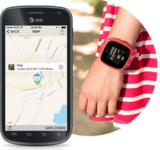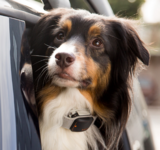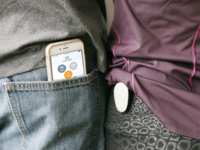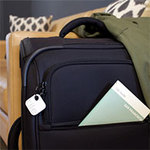It's 10PM -- do you know where your children, dog, luggage, phone and everything else you own is? Now you can. But do you want to?
Parenting is 1% inspiration, 10% perspiration and 89% constant requests like "Mom, do you know where I put the _____." As technologies that incorporate GPS, WiFi, Bluetooth and the cloud become ubiquitous and inexpensive, parents can keep constant tabs on the things that they love. But, in an age when you can keep track of everything you own and everyone you love, how far will you go with the digital collar thing?
I've been thinking about this as I look at the new breed of "locators." There are products that help you locate just about anything. For kids, there are products like hereO and FiLIP (pictured above- top)-- wristbands that notify parents of their kids' whereabouts at any given moment and signal them in case of an emergency or unusual pattern (say your child does not show up as having made it to school, for example). For dogs, there are collars like the Tagg pet tracker (pictured above- bottom) and Whistle pet tracker. For aging parents, there are products like Lively and Wearsafe (Wearsafe, pictured below-top, markets itself for all ages). For luggage, pocketbooks, briefcases and other inanimate objects, you've got Trackr and Tile (pictured below- bottom). All of these rely on similar building blocks -- a device that gets worn by the thing you're looking to track. That device will then communicate with a companion smartphone. A parent with a mobile phone can transform themselves into "command central" for mis-placed people and things.
Creepy or a high tech blessing? Depends who you ask. Research from jewelry makers shows that most women report that they do not want to wear anything that would allow people to track them. Most parents are very ambivalent about using trackers because it's sends a message to their kids that they are in a state of constant surveillance. Most elderly I ask are terrified of the idea of broadcasting anything that might have them perceived as not being in control -- even to their own family members. Pets, they seem happy enough to wear anything, though the tracking collars can be quite large. Luggage, briefcases, handbags don't mind being tagged, but you'll probably mind a lot of the false positives you encounter when trying to use these things.
And yet, in a world full of unknowns and unexpected incidents, an emergency alert system might be just the thing that lets us live with a bit more freedom. If you knew you could be located the instant you were in any sort of trouble would you wear a tracker? Would you let your kids roam further (walk to school, take a bicycle ride) if you know they could signal you at any moment and you could immediately locate them? Would you feel better about leaving your aging parents in their own homes knowing you'd be in constant touch?
The digital world has constantly asked us to perform a mental tug of war: privacy versus the convenience of having an Internet that knows who we are and what we want. We watch a movie, read a book, listen to music and we immediately get served our "might likes"-- everything from vacations, restaurants and clothing. Now that location is tossed into the high tech possibilities, you need to think of it as an extension of your online privacy. Tagging and tracking things is a form of surveillance. Surveillance might ultimately let you find a lost laptop, locate a strayed Lassie or save the life of someone you love.
Once you're passed the existential dilemma of whether to track or not, you're bound to encounter the current technologies limitations, too. Most tracking devices depend on you having a working mobile phone (that means a charged battery) and paying some service fee for monthly connectivity. And then the list of user errors... losing the device, leaving it home, putting on the wrong handbag, tossing it in the wash, are just some of the gadget foibles that await. Be prepared for false positives too. For example, I use a tracker to let me know where my mom is and it's always sending me false alarms.
To track or not to track? I'm convinced that tracking our kids, our elderly and our pets is going to become commonplace. The technologies work relatively well and could be the deal breaker in many an unpleasant situation. Tracking the other stuff? My formula is that if losing it costs more in aggravation than adding one more device to your Bluetooth enabled arsenal, go ahead and do it. For now, I'm all for tracking young kids, older family members, roaming pets, luggage and pocketbooks. Not sure I can handle keeping tabs on more items than those, without creating a personal tracker hell. What about you?
Robin Raskin is founder of Living in Digital Times (LIDT), a team of technophiles who bring together top experts and the latest innovations that intersect lifestyle and technology. LIDT produces conferences and expos at CES and throughout the year focusing on how technology enhances every aspect of our lives through the eyes of today's digital consumer.




